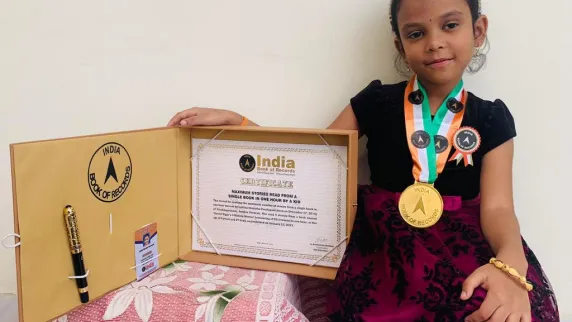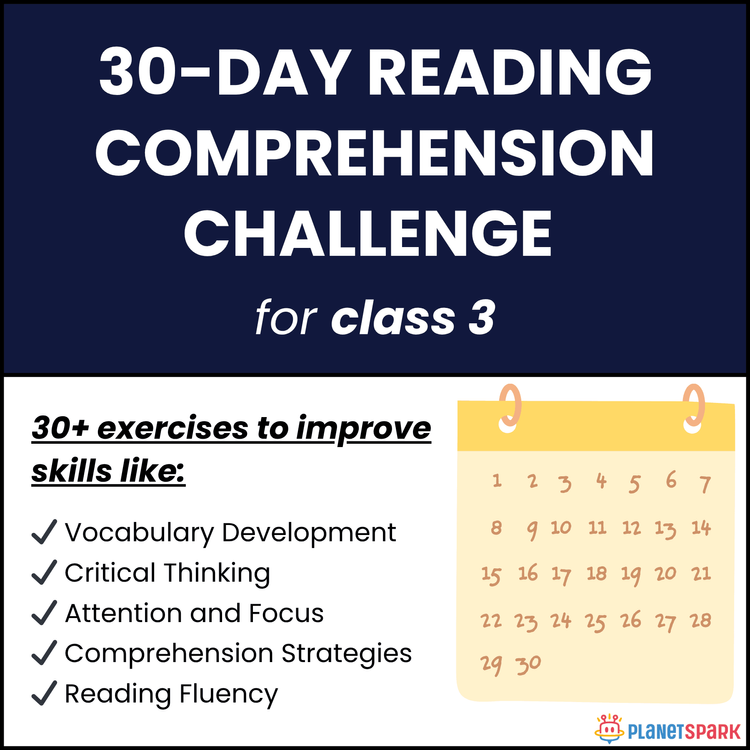Descriptive Writing for Class 4: Tips, Samples & Prompts
Last Updated At: 29 Jan 2026
11 min read

Table of Contents
- What is Descriptive Writing in Class 4?
- Why Descriptive Writing Skills Matter for Class 4 Students
- Descriptive Writing Samples for Class 4 Students
- Key Benefits of PlanetSpark's Descriptive Writing Classes fo
- Best Descriptive Writing Prompts for Class 4 Students by The
- Curriculum Breakdown: Stages of Descriptive Writing for Clas
- What Makes a Great Descriptive Essay?
- Curriculum Stages Enhanced with Research Best Practices
- Free Online Descriptive Writing for Grade 4: Is It Effective
- Conclusion
Descriptive writing is one of the most important building blocks of a child's communication and storytelling skills. At the 4th-grade level, students begin exploring vivid imagery, figurative language, and sensory detail to create engaging narratives and essays. These early experiences in writing don't just develop language skills; they nurture creativity, build confidence, and enable kids to express themselves authentically.
What is Descriptive Writing in Class 4?
In most writing schools, descriptive writing is one of the first genres introduced to young learners. Students in 4th-grade descriptive writing classes are usually tasked with describing:
- Themselves
- A person of significance
- A home or special location
- A prized possession
- A memorable summer vacation
The core goal? To paint a picture in the reader's mind by vividly illustrating a person, place, or thing using the five senses: sight, sound, smell, taste, and touch.
Effective descriptive writing brings scenes and experiences to life. After reading such an essay, a reader should feel like they’ve met the person, visited the place, or held the object in their hands. That level of immersion is the hallmark of a well-written descriptive piece.
Why Descriptive Writing Skills Matter for Class 4 Students
Descriptive writing enhances much more than just vocabulary. Its benefits include:
- Improved Language Mastery: It teaches how to use adjectives, verbs, and nouns more precisely.
- Boost in Creativity: Kids learn to think outside the box and expand on their imaginative ideas.
- Better Organization: Structuring ideas logically prepares students for more advanced essays later.
- Engagement in Learning: Students feel empowered when writing about topics of personal relevance.
PlanetSpark’s courses elevate these benefits by integrating technology, personalized instruction, and real-world performance opportunities into every child’s learning journey.

Descriptive Writing Samples for Class 4 Students
Looking for descriptive writing examples for Class 4 kids? Here are engaging and age-appropriate samples that showcase how students can use vivid vocabulary and sensory details to bring their ideas to life. These short passages help children understand how to describe places, pets, objects, and experiences with imagination and clarity.
Descriptive Writing About a Place – My Favorite Place: The Beach
The beach is my favorite place. The golden sand feels warm under my feet, and the waves crash with a soothing sound. The salty breeze blows through my hair, and I can smell the fresh ocean air. I love building sandcastles and watching the tiny crabs scurry along the shore. The water is cool and splashes against my legs as I run. When the sun sets, the sky turns orange, pink, and purple like a beautiful painting.
Descriptive Paragraph About a Pet – My Pet Dog Bruno
Bruno is a big, fluffy golden retriever. His fur is soft like a pillow, and his tail wags every time he sees me. He has shiny black eyes and a wet nose that tickles my hand. Bruno loves to play fetch and runs like the wind in the park. At night, he curls up next to me and snores gently. He is not just a pet; he is my best friend.
Descriptive Writing About a Dream Place – My Dream House
My dream house is a big, colorful cottage in the mountains. It has red brick walls, large glass windows, and a blue roof. Inside, there are cozy rooms with soft carpets and warm lights. The kitchen smells of fresh cookies, and the fireplace keeps the living room warm. Outside, there’s a big garden with sunflowers, butterflies, and a wooden swing hanging from a tree.
Descriptive Writing About an Experience – A Visit to the Fair
The fair was full of lights, laughter, and music. I saw giant balloons, cotton candy stands, and rides spinning in every direction. I went on the Ferris wheel and saw the whole city from the top. People were cheering, and children were holding colorful toys. The smell of popcorn and spicy snacks filled the air. My heart raced with joy as I tried every ride and game.
Descriptive Writing About an Object – A Basket of Fruits
The fruit basket looked like a rainbow. There were red apples, green grapes, yellow bananas, and juicy oranges. The mango smelled sweet and ripe, while the strawberries looked shiny and fresh. I picked up a peach and felt its soft, fuzzy skin. When I bit into it, sweet juice dripped down my chin. Every fruit was bursting with flavor and color.
Key Benefits of PlanetSpark's Descriptive Writing Classes for Grade 4
PlanetSpark’s creative writing curriculum for Class 4 is packed with features that transform learning:
- Helps children write detailed and engaging descriptions.
- Encourages the use of vibrant vocabulary and figurative language.
- Builds confidence in written and spoken storytelling.
- Provides feedback that helps kids reflect and revise effectively.
- Makes writing fun with interactive elements and gamified challenges.
Let your child explore characters, settings, and plots with expert-led creative writing classes. Sign up for a free trial class now!
Best Descriptive Writing Prompts for Class 4 Students by Theme
Help your child explore the magic of words with these imaginative and skill-building descriptive writing prompts for Class 4. Categorized by themes like places, pets, home, food, and fantasy, these prompts are perfect for improving creativity, vocabulary, and sensory expression in young writers.
Descriptive Writing Prompts About a Place
Describe your favorite place to visit during the holidays. What do you see, hear, smell, and feel there?
Imagine you are walking through a magical forest. What does it look like? What sounds do you hear?
Write about your school playground. What games do you play, and what does it look like when it's full of children?
Descriptive Writing Prompts About Pets or Animals
Describe your pet or an animal you wish you had. What does it look like, and how does it behave?
Imagine you meet a talking animal in the zoo. What kind of animal is it, and what does it say?
Write about a day in the life of a cat or dog. What do they do all day?
Descriptive Writing Prompts About Home and Objects
Describe your bedroom. What are your favorite things about it, and how does it make you feel?
Imagine you found a magical object in your home. What is it, and what makes it special?
Describe your school bag and everything you keep in it. How do you feel when you carry it to school?
Descriptive Writing Prompts About Experiences
Write about a fun fair or amusement park visit. What did you see, eat, and do?
Describe your birthday party. What games did you play? Who came? What presents did you get?
Imagine a family picnic in the park. What did you eat? What activities did you enjoy?
Descriptive Writing Prompts About Food
Describe your favorite meal. What does it smell, taste, and look like?
Imagine you are a chef in a fancy restaurant. What dishes do you cook and serve?
Write about the first time you tried a new fruit or snack. How did it taste and feel?
Creative Fantasy-Themed Descriptive Prompts
Imagine you're visiting a candy land. Describe what everything is made of.
Describe a flying car you invented. What color is it? What does it sound like when it flies?
Write about a treasure chest you found in your backyard. What’s inside?
Discover how PlanetSpark nurtures young authors through interactive lessons and real-time feedback. Start with a free trial class for your Class 4 child today!
Curriculum Breakdown: Stages of Descriptive Writing for Class 4
1. Prewriting Stage
- Students brainstorm who or what they want to describe: a person, place, object, or experience.
- They explore emotions, memories, and key characteristics associated with the subject.
- A structured outline is created, focusing on the logical sequencing of ideas.
2. Drafting Stage
- Kids follow their outline and start building their first draft.
- Emphasis is placed on the “show, don’t tell” technique.
- The five senses are used to bring scenes and emotions to life.
3. Revision Stage
- Students learn how to edit, rearrange, and refine their writing.
- Questions they ask include: "Does this evoke emotions?", "Is it vivid enough?", "Is the sequence logical?"
- They make sure every paragraph has a clear purpose and supports the central theme.
What Makes a Great Descriptive Essay?
- Sensory Richness: Appeals to sight, hearing, taste, touch, and smell.
- Figurative Language: Uses metaphors, similes, and analogies to enrich descriptions.
- Strong Vocabulary: Avoids vague terms and passive voice.
- Clear Organization: Follows a logical sequence, usually starting broad and then narrowing down.
- Emotional Connection: Encourages readers to empathize or recall similar experiences.
All these components are systematically taught in PlanetSpark’s grade 4 descriptive writing classes through fun assignments and feedback loops.
Our creative writing course is designed to enhance imagination, grammar, and confidence. Enroll today for a no-cost trial session and experience the difference.
Curriculum Stages Enhanced with Research Best Practices
Prewriting (Brainstorming & Planning)
Emphasize graphic organizers, story maps, and the Four‑Square writing method for organizing ideas before drafting. These strategies are commonly used across platforms like Route2Write, Outschool, and Miacademy to help young writers clarify their thoughts before they begin writing.
Encourage multi-sensory brainstorming: ask questions like “What does it sound like?”, “How does it feel?”, and “What memories does it bring?” This technique is used to stimulate richer, more detailed descriptive writing.
Drafting (Composition & Sensory Detailing)
Showcase annotated writing samples that highlight the use of sensory verbs and figurative phrasing. Many expert-led platforms, incorporate this method to teach how to enhance written expression.
Use live coaching or teacher prompts to teach “show, don’t tell” writing strategies. Encourage students to use vivid language and precise imagery to bring their writing to life.
Revising & Editing
Use guided peer review based on rubrics that align with standards like the Common Core and programs such as Writing Wings. These rubrics help students evaluate clarity, organization, style, and mechanics in writing.
Encourage children to read their drafts aloud. This auditory check helps identify awkward phrasing, inconsistencies, and tone mismatches that may not be obvious when reading silently.
Publishing & Sharing
Provide opportunities for students to publish their stories in class journals, school newsletters, or through online platforms that showcase student writing. Some programs often include this stage to instill a sense of accomplishment and motivation.
Encourage peer appreciation and feedback. Children learn not only to improve their writing but also to respect and critically engage with others' work.
From fun prompts to structured storytelling, our course is perfect for Class 4 learners. Claim your free trial class to get started.
Integration of Cross-Platform Best Practices
Many programs use methods like emphasizing age-appropriate creative writing with multimedia elements, such as illustrations or audio narrations, to enhance engagement.
Use gamified progress tracking where children earn badges or rewards for milestones like using five sensory details or revising a paragraph twice. This has been shown to significantly improve writing persistence and motivation.
Incorporate storytelling workshops where students take turns narrating parts of a story. This collaborative storytelling builds narrative understanding and strengthens oral and written fluency.
Overall, incorporating these strategies creates a dynamic, interactive, and research-backed approach to teaching descriptive writing in Class 4. It aligns closely with practices seen in leading programs and ensures students develop strong foundational writing skills joyfully and effectively.

Free Online Descriptive Writing for Grade 4: Is It Effective?
Absolutely! Free online writing programs are accessible, flexible, and engaging. When combined with structured mentorship as in PlanetSpark, they create optimal learning environments. Kids can experiment with writing styles, receive instant feedback, and improve progressively.
Key Features:
- 1:1 Personal Trainers for Every Child
Certified communication experts provide individual attention, personalized coaching, and live feedback. - Personalized Curriculum
Customised learning roadmaps based on initial skill assessments and ongoing progress. - SparkX AI-Enabled Video Analysis
Tracks speech, clarity, grammar, confidence, and delivery for measurable growth. - AI-Led Speech Practice
Real-time practice activities with instant feedback on voice modulation and structure. - Spark Diary
A digital journaling tool to build writing habits through reflections, prompts, and poetry. - Gamified Learning Tools
Quizzes, games, and challenges for vocabulary, grammar, and writing skill development. - Structured PTMs and Reports
Transparent performance tracking and regular parent-teacher interactions.
Conclusion
High-quality descriptive writing instruction in 4th grade should combine structured stages, sensory-rich content, model texts, feedback loops, and motivational elements. PlanetSpark’s Creative Writing Courses embody these research-backed elements while adding unique features like AI assessment, personalized goals, gamified learning, and creative communities—all of which support engaged, measurable improvement.
By combining best practices and writing‑curriculum research, parents and educators can ensure that 4th graders not only learn to observe, imagine, and describe but also take joy in crafting vivid, meaningful narratives.
Frequently Asked Questions
It’s the art of using detailed, sensory-rich language to describe people, places, or things. Students learn to structure essays that evoke vivid images in the reader’s mind.
A descriptive essay should have a strong introduction, detailed body paragraphs using sensory detail, and a meaningful conclusion. Kids are encouraged to use similes, metaphors, and vibrant vocabulary.
Start with models and examples. Use brainstorming exercises, graphic organizers, and sensory language charts. Incorporate feedback and revision steps regularly.
Avoid vague words, repetition, weak verbs, lack of sensory detail, and unstructured flow.
Parents receive performance reports, participate in regular PTMs, and can monitor progress through the Spark Diary and feedback tools.
When Parents Believe, Children Shine
Real stories of transformation, confidence, and communication success — straight from the parents who trusted us.
Book a Free Demo Now!Download Free Worksheets
Personalized Communication Report
Record a video to get a AI generated personalized communication report for your child
Select Learner's Class

Hi There, want to try these
tips for your child with
LIVE with our expert coach?
Let's check your child's
English fluency






